Design decisions for buildings and communities are critical to efforts to increase local and regional resiliency. Building designers — of residential, institutional, and commercial structures — should strive to incorporate passive and active survivability concepts into new and renovated structures.
Community planners and developers need to incorporate concepts that increase the capacity to maintain transportation flow, strategies to handle water management, and infrastructure approaches that will withstand a variety of risks.
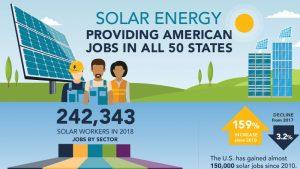
2018 National Solar Jobs Census
The Solar Foundation’s National Solar Jobs Census 2018 is the ninth annual report on the size and scope of the American solar workforce. Based on a rigorous survey of solar employers, it is the most comprehensive analysis of solar labor market trends in the United States.
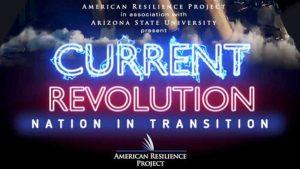
American Resilience Project: Current Revolution – A Film Series for the Energy Transition
“Current Revolution” is a film series produced by American Resilience Project that covers various topics concerning the energy transition.

Clean Energy Can Supercharge Virginia’s Economy — If State Leaders Seize this Moment
Virginia could capitalize on federal funding and become a leader in clean energy industries of the future – creating hundreds of thousands of new, well-paying jobs. But for this to happen, state leadership must recognize the economic opportunities of this moment.
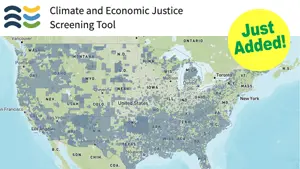
Climate and Economic Justice Screening Tool
The Climate and Economic Justice Screening Tool from the Council on Environmental Quality features an interactive map and uses datasets that are indicators of burdens in eight categories: climate change, energy, health, housing, legacy pollution, transportation, water and wastewater, and workforce development.
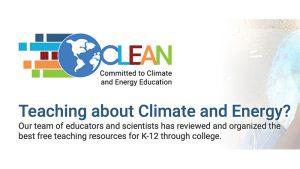
Climate and Energy Educational Resources (CLEAN)
The CLEAN Collection of Educational Resources offers over 800 accurate and credible resources for education about climate and energy topics.
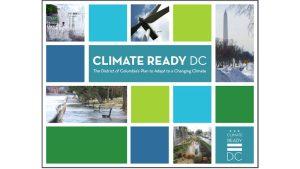
Climate Ready DC: The District of Columbia’s Plan to Adapt to a Changing Climate
Climate Ready DC is the District of Columbia’s strategy to make the District more resilient to future climate change while helping to ensure that our city continues to grow greener, healthier, and more livable.

Envision Rating System for Sustainable Infrastructure
Published in 2015, the Envision system is composed of tools, covering all aspects of a product’s lifecycle, that are meant to introduce sustainability into infrastructure projects.

Georgetown Climate Center
The nonpartisan Georgetown Climate Center seeks to advance effective climate, energy, and transportation policies in the United States—policies that reduce greenhouse gas emissions and help communities adapt to climate change. The Center also seeks to ensure that national climate and energy policy is informed by lessons from existing state efforts and that national policies maintain an ongoing role for state innovation and implementation.
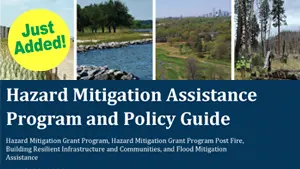
Hazard Mitigation Grant Program (HMGP)
FEMA’s Hazard Mitigation Grant Program provides funding to state, local, tribal and territorial governments so they can develop hazard mitigation plans and rebuild in a way that reduces, or mitigates, future disaster losses in their communities.
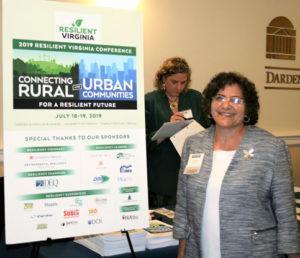
Longtime Environmental Advocate Reflects on Virginia’s Path to 100% Clean Energy
Annette Osso, now the managing director of Resilient Virginia, first delved into energy projects in the 1970s. Reprinted with permission from Energy News Network RICHMOND,

2018 National Solar Jobs Census
The Solar Foundation’s National Solar Jobs Census 2018 is the ninth annual report on the size and scope of the American solar workforce. Based on a rigorous survey of solar employers, it is the most comprehensive analysis of solar labor market trends in the United States.

American Resilience Project: Current Revolution – A Film Series for the Energy Transition
“Current Revolution” is a film series produced by American Resilience Project that covers various topics concerning the energy transition.

Clean Energy Can Supercharge Virginia’s Economy — If State Leaders Seize this Moment
Virginia could capitalize on federal funding and become a leader in clean energy industries of the future – creating hundreds of thousands of new, well-paying jobs. But for this to happen, state leadership must recognize the economic opportunities of this moment.

Climate and Economic Justice Screening Tool
The Climate and Economic Justice Screening Tool from the Council on Environmental Quality features an interactive map and uses datasets that are indicators of burdens in eight categories: climate change, energy, health, housing, legacy pollution, transportation, water and wastewater, and workforce development.

Climate and Energy Educational Resources (CLEAN)
The CLEAN Collection of Educational Resources offers over 800 accurate and credible resources for education about climate and energy topics.

Climate Ready DC: The District of Columbia’s Plan to Adapt to a Changing Climate
Climate Ready DC is the District of Columbia’s strategy to make the District more resilient to future climate change while helping to ensure that our city continues to grow greener, healthier, and more livable.

Envision Rating System for Sustainable Infrastructure
Published in 2015, the Envision system is composed of tools, covering all aspects of a product’s lifecycle, that are meant to introduce sustainability into infrastructure projects.

Georgetown Climate Center
The nonpartisan Georgetown Climate Center seeks to advance effective climate, energy, and transportation policies in the United States—policies that reduce greenhouse gas emissions and help communities adapt to climate change. The Center also seeks to ensure that national climate and energy policy is informed by lessons from existing state efforts and that national policies maintain an ongoing role for state innovation and implementation.

Hazard Mitigation Grant Program (HMGP)
FEMA’s Hazard Mitigation Grant Program provides funding to state, local, tribal and territorial governments so they can develop hazard mitigation plans and rebuild in a way that reduces, or mitigates, future disaster losses in their communities.

Longtime Environmental Advocate Reflects on Virginia’s Path to 100% Clean Energy
Annette Osso, now the managing director of Resilient Virginia, first delved into energy projects in the 1970s. Reprinted with permission from Energy News Network RICHMOND,
